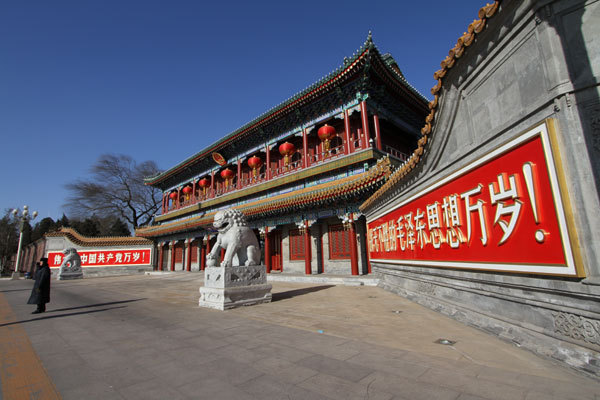 |
|
Leading scholars regularly address China's top leaders behind these gates at the Zhongnanhai compound. Their views influence national policies to some degree. Provided to China Daily |
National leaders keep up with latest developments, Wu Wencong, Jiang Xueqing and Li Jing report in Beijing.
It's a once-in-a-lifetime experience for most of these scholars.
They may have given lectures to thousands of students or government officials over their careers.
But this is an opportunity, and a very daunting assignment - lecturing the 25 highest-ranking leaders in China.
Nearly every month since the end of 2002, two scholars have been invited into Zhongnanhai, seat of the central government, to lecture on a particular topic to members of the Political Bureau of the Communist Party of China (CPC) Central Committee.
Sitting opposite the lecturers at the table is President Hu Jintao.
Luckily, the scholars have plenty of time to get ready - usually three to six months - and repeatedly review every draft of their notes.
|
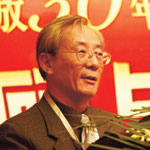 Zhang Baijia, deputy director of the Party History Research Center of the CPC Central Committee. |
"It took at least three or four drafts before the lecture notes finally got through, not to mention the small changes we made," said Zhang Baijia, deputy director of the Party History Research Center of the CPC Central Committee.
Zhang went to Zhongnanhai compound on Dec 26, 2008, to discuss the deepening of reform and opening-up. The other speaker that day was Yang Qiubao, a professor of microeconomics with the Party School of the Central Committee.
The study session usually lasts for an hour and a half, with each scholar talking for half that time, followed by 20 minutes of discussion and a brief summary by Hu. Sometimes other officials attend when the subject is relevant to their responsibilities, but they don't participate in the discussions.
On the day Zhang spoke, he said, "We covered many aspects of the reform and opening-up, including economic growth, political development and social construction. As we have only 45 minutes each, the lecture has to be highly condensed and we could only touch upon the most important issues."
Zhang mainly talked about historical development of the reform, while Yang focused on its challenges, prompting most of the questions, Zhang said.
The speakers and leaders exchanged their views during the discussions. Sometimes, they did not agree.
For example, Zhang and Yang said the reform would face new challenges as it deepened, because international relations with China had become less friendly since the Soviet Union collapsed. Some leaders, on the contrary, said the reform was more difficult when it started and the current problems were relatively easier to solve.
75 and counting
The latest topic that has been released to the public, for lectures given on Aug 23, was China's land management system. The teachers that day were Liu Shouying, a scholar of rural economy at the State Council's Development Research Center, and Lin Jian, an associate professor in Peking University's College of Urban and Environmental Sciences.
Lectures were presented intermittently, and on law-related topics only, as early as 1994. But it wasn't until late 2002 that a formal system of routine group study was established, with much more diverse topics. The August session was the 75th, and 145 scholars have appeared, a couple of them twice.
The scholars come from the Chinese Academy of Social Sciences, the Party School, the Chinese Academy of Governance and some of the country's high-ranking universities.
Previous topics involved economics, politics, law, culture, society, history, international affairs, military, and Party building. The exact time, topic and lecturers of each session are published, usually months later, on Xinhuanet.com in Chinese.
Choosing the lecturers
Zhang said the speakers are usually nominated by the institutions they belong to after the institutions receive lecture invitations with assigned topics from the General Office of CPC Central Committee, three to six months in advance.
Each institution will then organize its own team of experts to write a draft for the lecture and send it to the general office for review. The office will give suggestions and send it back for revisions.
|
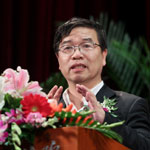 Huang Renwei, vice president of the Shanghai Academy of Social Sciences. |
Huang Renwei, vice president of the Shanghai Academy of Social Sciences, said that in some cases, the mission is pointed to a certain ministry, such as the Ministry of Foreign Affairs. The ministry then assigns the task to several members of its expert pool, asking for lecture guidelines.
"The final candidate, usually the top researcher in a certain field or the one with the most profound findings, will be selected based on the guidelines they hand in," Huang said.
Speakers selected are often around the age of 50, although that is trending younger. The youngest on the list was 38 when giving the lecture, and the eldest 73, according to the book High-Level Forum. It was published by Hongqi Press (Red Flag Press), which is almost 30 years old and mainly publishes books about Party-building.
Theoretical and practical
Many of the themes chosen for the group study are highly targeted and closely linked to the country's most significant issues at a certain time. When the financial crisis first appeared in 2007, for example, a lecture on "research about speeding up the transformation of economic development within the country" was arranged early the next year.
Then there was the 23rd session on June 27, 2005, on the status of energy resources within the country and globally. Hu was thus well prepared when he visited Russia three days later for discussions that included cooperation on energy issues.
|
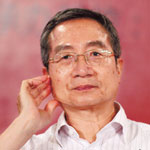 Zhou Dadi,vice-chairman of the National Energy Advisory Committee. |
Zhou Dadi was one of the two lecturers at that first energy session. There have been three others since then, and the topics of all four have been either China's energy consumption or greenhouse gas emissions.
"Back then, it was the first time to give the top leaders a systematic introduction to China's energy situation - resource abundance, consumption and the security issue, and why it is important to build a conservation-minded society," said Zhou, vice-chairman of the National Energy Advisory Committee.
"Retrospectively, the lecture laid a very solid foundation for a series of energy policies that followed," he said.
Since 2006, the central government has attached greater importance to energy conservation and pollution reduction. Improving energy efficiency by 20 percent was written into the country's five-year social and economic development plan as a legally binding target for the first time that year. And in 2009, Premier Wen Jiabao pledged that carbon emissions for each unit of economic growth would drop by 40-45 percent between 2005 and 2020.
"The aim of the lecture, as President Hu made it quite clear in his summary," Zhou said, "was to form some common ground among top leaders on the energy issue - not necessarily leading to any policy change, but still providing a firm knowledge basis for future policymaking."
Zhou had to submit a written draft for review and make some changes "so that the officials can better understand". The lecture had to be information-based, but not too academic and detailed, because the audience would be composed of all ministers and provincial governors as well as the Politburo.
Not time or place to push
Though it is an honor and not easy to be selected to lecture at Zhongnanhai, many experts interviewed emphasized that it is not exactly the best place or situation to pitch their own research ideas or opinions, as some people might assume.
"The final draft does not reflect the speaker's personal opinion to a large extent," said Zhang Baijia from the Party History Research Center. "Instead, it is a result of group discussions. Sometimes, if the topic is large in scale, experts from more than one institution will take part in the discussions.
"I feel that experts specializing in science and economy will have more freedom on what to say in their lectures compared to us who are assigned topics on politics and the Party," Zhang said.
An economist had a different view.
|
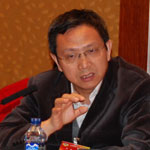 Jia Kang, researcher at the Finance Ministry's Research Institute for Fiscal Science. |
"After rounds of discussion and amendment, the notes for the lecture will be fixed. And we cannot lecture on points other than those written on the notes," said Jia Kang, who spoke at a session about tax reform in January 2010. He was a researcher at the Finance Ministry's Research Institute for Fiscal Science at the time, and now leads the institute.
Zhou Dadi from the National Energy Advisory Committee shared Jia's thinking. "You need to give some policy advice, but you are not in the position to persuade the top leaders to accept them.
"Especially when several contradicting views of points exist regarding a certain issue," Zhou said, "the lecturer needs to inform the top leaders, and tell them which is the mainstream one.
"As a lecturer, you may have the privilege of expressing your own opinion, but you can't just champion it without introducing different views."
The program's impact
In August 2006, Zhang Li, head of the National Center for Education Development Research, gave a lecture on China's education reform. The following May, a new policy was announced, granting six normal universities free entry opportunities for students majoring in education starting in 2007.
This illustrates why outsiders see every topic of the group study as an important sign that navigates the country's development. But Jia did not consider that a fair comment.
"The lectures do have an impact on the policies, but it is more like ... a subtle and imperceptible influence," he said. "It is not exactly correct to say that a single lecture can directly shape the policies."
The scholars interviewed seem to agree when it comes to the effectiveness of the lectures. "The discussion on practical issues among top leaders and experts will work as an important advisory reference when making strategic decisions," Jia said.
Hu Min, deputy director-general of the research office in the Chinese Academy of Governance, said setting up the system of routine group study within the Politburo is a succession of earlier practices in Party history.
"Learning about history and cutting-edge theories, as well as putting them into practice, has always been a focus for the CPC's top leaders," Hu said. He mentioned the examples of inviting Marxist theories during the Party's early days and absorbing market economy theories during the reform and opening-up. The learning orientation, in his opinion, is necessary for a "mature political party".
Huang, the social scientist, said the best part of the system is linking national policies with findings of the think tanks.
"For researchers, study is meaningless unless it is taken into consideration by decision-makers. And talking to only one top leader also won't do," he said.
"I don't think there is another country that has such a group study system for all top leaders as we do."
Wang Yan contributed to this report.
